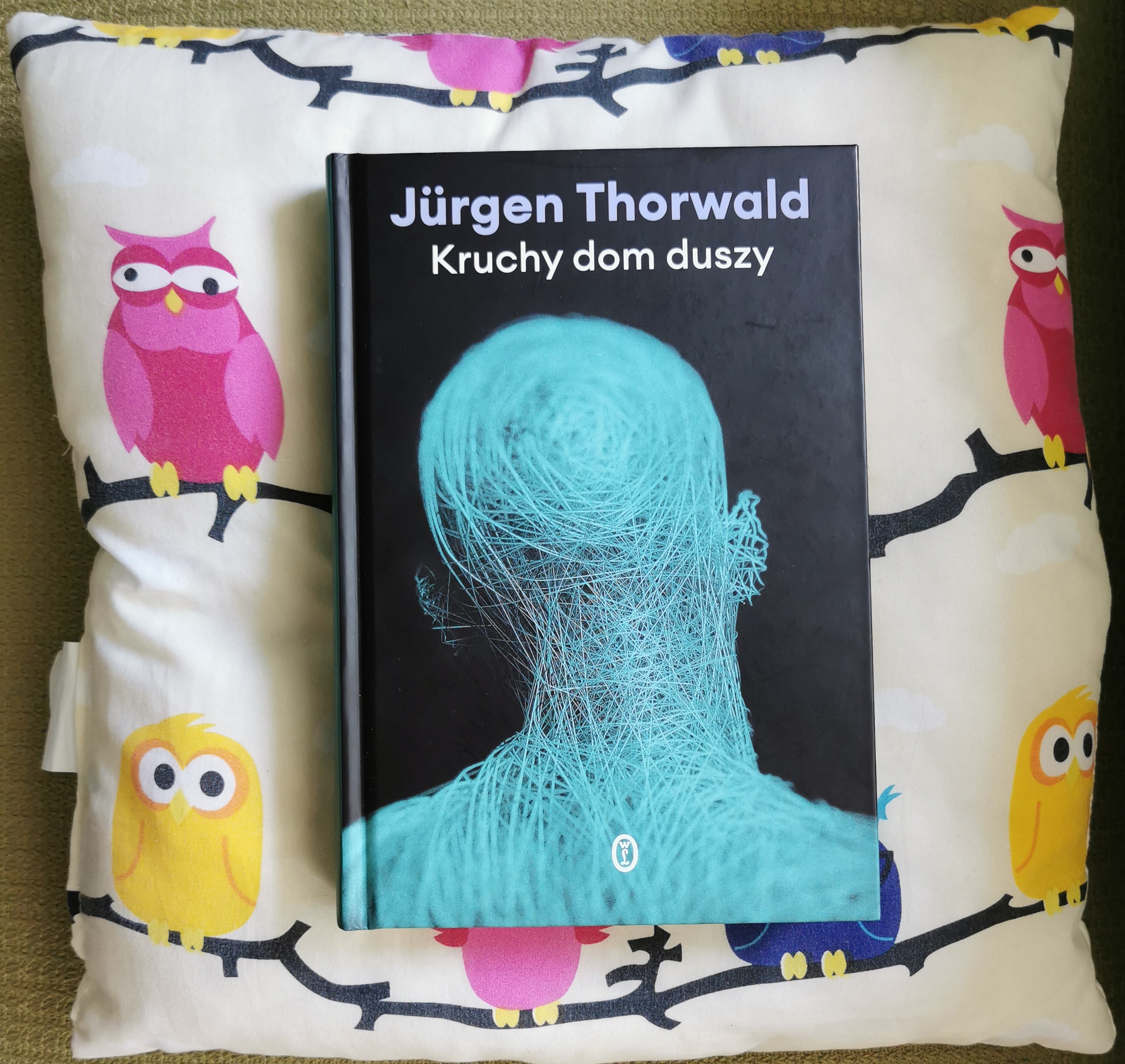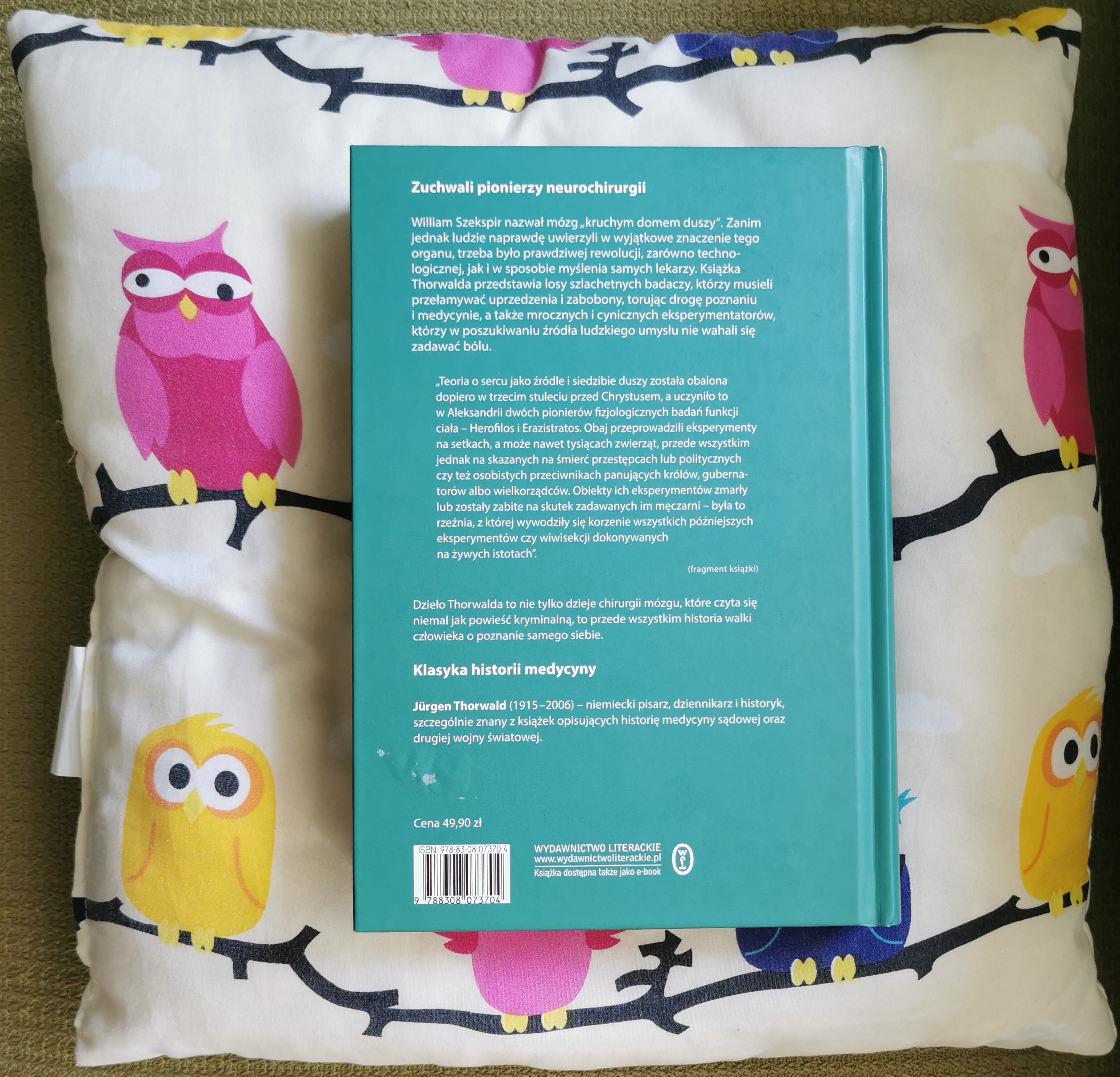[POL/ENG] Czytaj z Marcinem 11/52/2022 - "Kruchy dom duszy", Jürgen Thorwald // Reading with Marcin 11/52/2022, "The Soul’s Frail Dwelling House", Jürgen Thorwald

Jürgen Thorwald i medycyna – to połączenie gwarantuje, że w nasze ręce trafia książka co najmniej dobra, a nierzadko znakomita. Tym razem – w „Kruchym domu duszy” – zapoznajemy się z historią chirurgii mózgu i neurochirurgii.
Autor zabiera nas w podróż przez dekady, które przetarły szlak wiodący do współczesnej, w pełni nowoczesnej neurochirurgii – od londyńskich chirurgów Johna Jacksona, Williama Gowersa i Davida Ferriera z połowy XIX wieku po działalność Wildera Penfielda w Montrealu w latach 70 XX wieku, wspominając także prace teoretyczne medyków z wcześniejszych epok.
Dzięki temu wehikułowi czasu nie tylko poznajemy sylwetki czołowych pionierów neurochirurgii, ale także losy pacjentów, których dolegliwości w największym stopniu przyczyniły się do poszerzenia granic medycznej wiedzy – nawet jeśli czasami były to ślepe zaułki, jak w przypadku lobotomii. Przekonujemy się, jak krok po kroku lekarze uczyli się rozpoznawać przyczyny zaburzeń pracy mózgu, jak poznawali role poszczególnych jego obszarów i sposoby usuwania różnego rodzaju guzów i blizn tego kluczowego narządu, by uchronić pacjentów, na przykład, przed atakami epilepsji czy zmniejszyć dolegliwości powodowane przez chorobę Parkinsona. I – jak wiele zagadek i tajemnic jeszcze mózg przed nami skrywa.
Praca ta była ciężka i często niewdzięczna, a postęp nierzadko trzeba było opłacać tym najdroższym pieniądzem – krwią i życiem nie tylko zwierząt doświadczalnych, ale także pacjentów, jeśli dostępna metoda leczenia okazywała się nieskuteczna, lub choćby tylko niewystarczająco doskonała. My – czytelnicy – mamy szansę przejść tę drogę nie ponosząc tak wielkich ofiar, jeśli tylko zechcemy poświęcić swój czas na lekturę.

PODSUMOWANIE
Rozmiar: dość gruba (380 stron, większy format)
Szybkość czytania: raczej powoli, wymaga uwagi i skupienia
Wciąga: tak
Dla kogo: w zasadzie dla każdego, ale zainteresowanie medycyną i/lub biologią wskazane.
Zalety: daje szansę zapoznania się z przystępnie podaną historią jednego z najbardziej fascynujących działów medycyny, trzyma w napięciu, poszerza wiedzę.
Wady: w Polsce ukazała się ze sporym opóźnieniem względem Niemiec, więc brak najaktualniejszych osiągnięć doskwiera bardziej; tym razem brak bibliografii; tradycyjnie – cena na tyle wysoka, że warto szukać promocji.
Ocena: 9,5/10
---------------------------------------------------------------------------------------------------------------------------
Jürgen Thorwald and medicine - this combination guarantees that we get a book which is at least good, and often excellent. This time - in "The Soul’s Frail Dwelling House" - we learn about the history of brain surgery and neurosurgery.
The author takes us on a journey through the decades that paved the way to modern, fully-fledged neurosurgery - from the London surgeons John Jackson, William Gowers and David Ferrier in the mid-19th century to the work of Wilder Penfield in Montreal in the 1970s, also recalling the theoretical work of medics from earlier eras.
Thanks to this time machine, we not only learn about the leading pioneers of neurosurgery, but also about the fates of the patients whose ailments made the greatest contribution to extending the frontiers of medical knowledge - even if these were sometimes dead ends, as in the case of lobotomy. We see how, step by step, doctors learned to identify the causes of disorders of the brain, how they learned the roles of its various areas and how to remove various types of tumours and scars of this key organ in order to protect patients, for example, from attacks of epilepsy or to reduce the discomfort caused by Parkinson's disease. And - how many mysteries and secrets the brain still hides from us.
This work was hard and often unrewarding, and progress often had to be paid for with the most expensive coin - with the blood and lives not only of experimental animals, but also of patients, if the available method of treatment proved ineffective, or even insufficiently perfect. We, the readers, have the chance to walk this path without making such great sacrifices, if only we are willing to take the time to read.
SUMMARY
Size: rather thick (380 pages, larger format)
Reading speed: rather slow, requires attention and concentration
Addictive: yes
For whom: basically for anyone, but an interest in medicine and/or biology advisable.
Advantages: gives a chance to get to know the history of one of the most fascinating branches of medicine in an accessible way, keeps in suspense, broadens knowledge.
Disadvantages: in Poland, the book was published with a considerable delay in relation to Germany, so the lack of the most up-to-date achievements is more visible; this time there is no bibliography given; traditionally - the price is high enough, that looking for special offers is advisable.
Rating: 9.5/10
Posted using PALnet